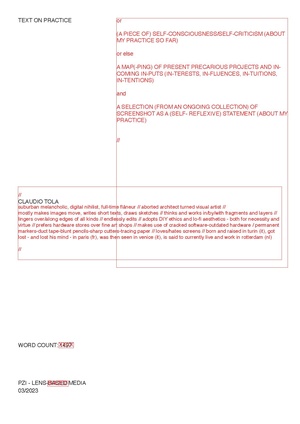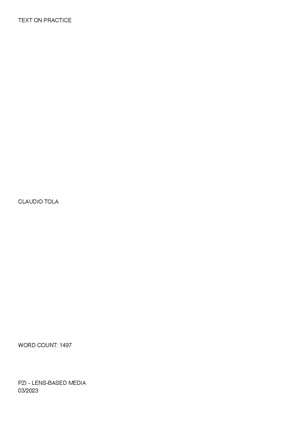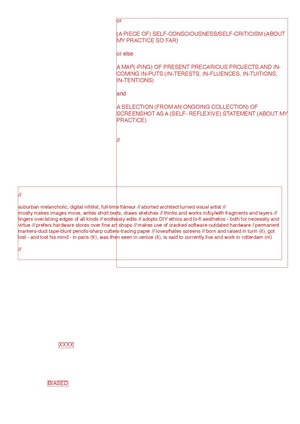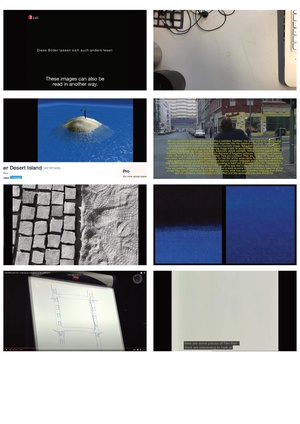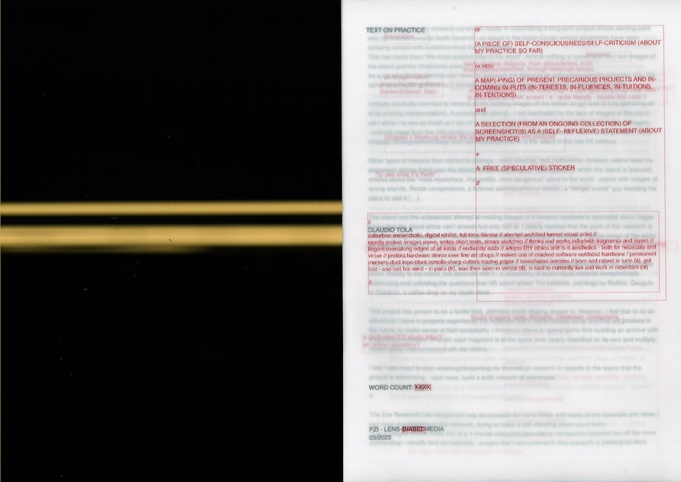Textonpracticefinal2023: Difference between revisions
No edit summary |
No edit summary |
||
| (8 intermediate revisions by the same user not shown) | |||
| Line 2: | Line 2: | ||
'''Screen version:''' | |||
[[File:Screen version - full.pdf|frameless]] | |||
Layer 1: Actual Text on practice (1500 words) | Layer 1: Actual Text on practice (1500 words) | ||
[[File:Screen version - layer 1.pdf|frameless]] | |||
Layer 2: Annotations | Layer 2: Annotations | ||
[[File:Screen version - layer 2.pdf|frameless]] | |||
Layer 3: Images | Layer 3: Images | ||
Print version: | [[File:Screen version - images.pdf|frameless]] | ||
'''Print version:''' | |||
[[File:Print version - scanned.pdf|frameless|681x681px]] | |||
(scan quality is not great, might upload a cleaner version in the future) | |||
Text: A4 tracing paper, unbinded | |||
Images: 9.5x5.5cm approx., inserted through the pages in no specific order | |||
A few words on why I made it this way: | |||
a | I wanted it not to be just a wordy description of my practice, but also to give an impression of it - of my own way of writing, thinking, working . A fragmented, layered, scattered, cumulative way of note-taking, through text and images, whose sense is to be found in the continuous, recursive re-editing of the pieces in always unstable, unsure wholes. A plain text pasted on a wiki page did not feel the right thing. Tracing paper comes from my architecture background. I use it to break through the paper surface and give visual depth to the text, layer it. The actual, formatted 1500-word 'text on practice' is overlayed with extra annotations, taken while writing, retrieved from old notes or added last minute. | ||
The mages come from an uncurated collection of screenshots, taken over the past months because in one way or another resonated with the processes I was going through. I did not want to pinpoint them to one or another bit of text, but rather let them move freely through the pages, allowing the reader the space to guess associations. | |||
Latest revision as of 10:03, 30 March 2023
Claudio's Text on practice
Screen version:
Layer 1: Actual Text on practice (1500 words)
Layer 2: Annotations
Layer 3: Images
Print version:
(scan quality is not great, might upload a cleaner version in the future)
Text: A4 tracing paper, unbinded
Images: 9.5x5.5cm approx., inserted through the pages in no specific order
A few words on why I made it this way:
I wanted it not to be just a wordy description of my practice, but also to give an impression of it - of my own way of writing, thinking, working . A fragmented, layered, scattered, cumulative way of note-taking, through text and images, whose sense is to be found in the continuous, recursive re-editing of the pieces in always unstable, unsure wholes. A plain text pasted on a wiki page did not feel the right thing. Tracing paper comes from my architecture background. I use it to break through the paper surface and give visual depth to the text, layer it. The actual, formatted 1500-word 'text on practice' is overlayed with extra annotations, taken while writing, retrieved from old notes or added last minute.
The mages come from an uncurated collection of screenshots, taken over the past months because in one way or another resonated with the processes I was going through. I did not want to pinpoint them to one or another bit of text, but rather let them move freely through the pages, allowing the reader the space to guess associations.

